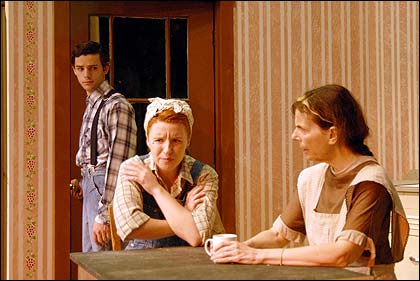
The Power of Television
Strong direction, acting gives glow to The Ruby Sunrise
by Anna Grace
The barn and everything in it, including Rubys prototype for the first television, is set ablaze. Why? Because she failed, or because she even tried to begin with?
 |
| Joseph Tanner Paul, Jessica Scetal and Rebecca Nachison in The Ruby Sunrise |
The Ruby Sunrise takes a very small, hugely important corner of history and illuminates it in light of censorship, prejudice and fear. Television ã the transmission of sound and pictures over the air ã was invented in 1927 by a few well-funded men. Rinne Groffs script imagines a 17-year-old girl with the same dream, twice the determination and everything in the world stacked against her.
The play is divided into three parts: The first section takes place in rural Indiana in 1927; part two is set in New York City in 1952; the final act melds the two times and places with the device of a television drama. It is an interestingly, if obviously, crafted play. The initial awkwardness pays off, by virtue of thoughtful performances and compelling direction.
Part One: Ruby (Jessica Svetal) is racing to create the first television, seemingly unaware that she is a teenage girl lacking the adequate resources. Her only battle is against time ã not against the aunt who doesnt want her, the abusive father shes fleeing or the lovesick college boy who follows her around, begging her to stop inventing.
Director Chris McVay paints a veneer of heightened theatricality over the awkward, staccato dialogue punctuated by long lumps of technical jargon flopping out. Brandon Rumseys original score directs emotions and places focus, but at some points forces the actors to shout, pushing the audience out of the story and back into their seats. The single-minded technical diatribes of inventor Ruby, the maudlin, drunken waxings of Aunt Lois and the confused confessions of love from Henry all play like a melodramatic screenplay. The audience waits, assuming all will be made clear. It is.
Part Two: We are snapped out of the drama and into the witty world of a new television studio, circa 1952. Rubys daughter Lulu (a perfectly cast Leela Gouveia) has landed herself a job as a script coordinator and works to get her mothers story told. The labored conversations of part one are replaced by clipped, cheerful chitchat reminiscent of a Tracey/Hepburn film. This part feels hopeful, as though Ruby and her dreams will live on. The actors flesh out the joyousness and humor. Chris Pinto is funny, working the lines of Martin Marcus, the pragmatic producer. Bruce McArthur is smooth as the gifted screenwriter falling in love with the gifted script girl. Everything is just delightful. Until it isnt.
Part Three: Groffs script hauls us out of the cheery world of detergent-selling pitches into the era of McCarthyism and censorship. Lulu unexpectedly explodes and is fired when the boys begin to tinker with her script in a manner she finds insulting to her mothers memory. Groffs moral indignation runs across the stage like broad strokes of crayon as the actors struggle to keep it real.
A real appreciation for the actors in part one grows as they return in roles playing their former selves. Particularly moving are Rebecca Nachison as the aging star Ethel Reed, and Jessica Svetal, a blacklisted actress prevented from the role shes born to play. Honest emotion keeps the action rolling until the script wends its way to a satisfying conclusion.
The Ruby Sunrise is not a tragedy. Neither of the strong-willed women gets what she wants, and the play contrasts how individually they deal with their disappointment. The struggle to succeed against the odds is depicted in a refreshing and charming manner, examining the issue of when to compromise and when to fight. Director McVay both focuses and softens the imperfect script, eking out an important story that is well worth seeing.
The Ruby Sunrise plays at the Very Little Theatre through June 11; tickets and info at www.thevlt.com